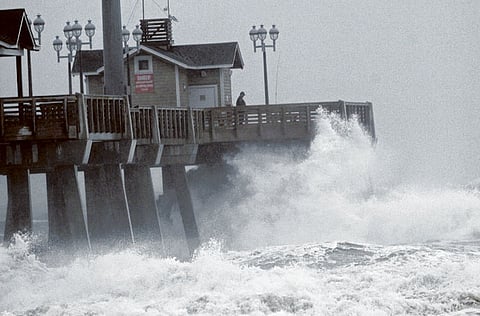Hurricane Sandy creates havoc for markets, businesses
New York Stock Exchange to close on Monday

New York: Hurricane Sandy took aim at the most densely populated US region on Monday, halting businesses and government departments.
All US stock markets will be closed on Monday and possibly Tuesday, the operator of the New York Stock Exchange said late on Sunday, reversing an earlier plan that would have kept electronic trading going on Monday.
Regulators, exchanges and brokers grew increasingly worried about the integrity of markets and the safety of employees.
It will be the first time the market has closed for a weather-related event since Hurricane Gloria on September 27, 1985.
A number of companies have postponed scheduled earnings releases, including Pfizer Inc and power firm Entergy Corp, and more were expected to follow suit.
NYSE Euronext’s New York Stock Exchange had initially planned to shut its physical trading floor, which would have meant operating as an all-electronic exchange for the first time.
The storm is expected to slam into the US East Coast on Monday night, bringing torrential rain, high wind, severe flooding and power outages. The rare “super storm” — created by an Arctic jet stream wrapping itself around a tropical storm — could be the biggest ever to hit the US mainland, forecasters said.
Wall Street had originally prepared to open for business on Monday with limited staffing after a mass transit shutdown in New York, booking hotel rooms for key employees and leaning on offices in other cities.
The decision to close stock and options markets came after regulators, exchanges, and dealers discussed the unknowns that would have been tested if the markets opened on Monday, sources familiar with the situation said.
The bond market will remain open until noon Eastern Time, according to SIFMA, a financial industry trade group.
Some bank offices in lower Manhattan’s Financial District are in evacuation zones and most non-critical staff and employees who don’t rely on high-speed systems, including some investment bankers, were asked to work from home.
For a list of how Wall Street firms and exchanges are dealing with Hurricane Sandy, please click
Earlier, officials ordered people in coastal towns and low-lying areas to evacuate, often telling them they would put emergency workers’ lives at risk if they stayed.
“Don’t be stupid, get out, and go to higher, safer ground,” New Jersey Governor Chris Christie told a news conference.
Transportation is grinding to a halt, with airlines cancelling flights, bridges and tunnels closing, and Amtrak scrapping nearly all of its passenger rail service on the East Coast. The federal government told non-emergency workers in Washington DC to stay home.
“This is a serious and big storm,” Obama said after a briefing at the federal government’s storm response centre in Washington. “We don’t yet know where it’s going to hit, where we’re going to see the biggest impacts.”
Utilities from the Carolinas to Maine reported late Sunday that a combined 14,000 customers were already without power.
The second-largest oil refinery on the East Coast, Phillips 66’s 238,000 barrel per day (bpd) Bayway plant in Linden, New Jersey, was shutting down and three other plants cut output as the storm affected operations at two-thirds of the region’s plants.
Oil prices slipped on Monday, with Brent near $109 (Dh300) a barrel. “With refineries cutting runs, we’re likely to see a build-up in crude stocks which could be driving bearish prices at the moment,” said Michael Creed, an economist at National Australia Bank in Melbourne.



